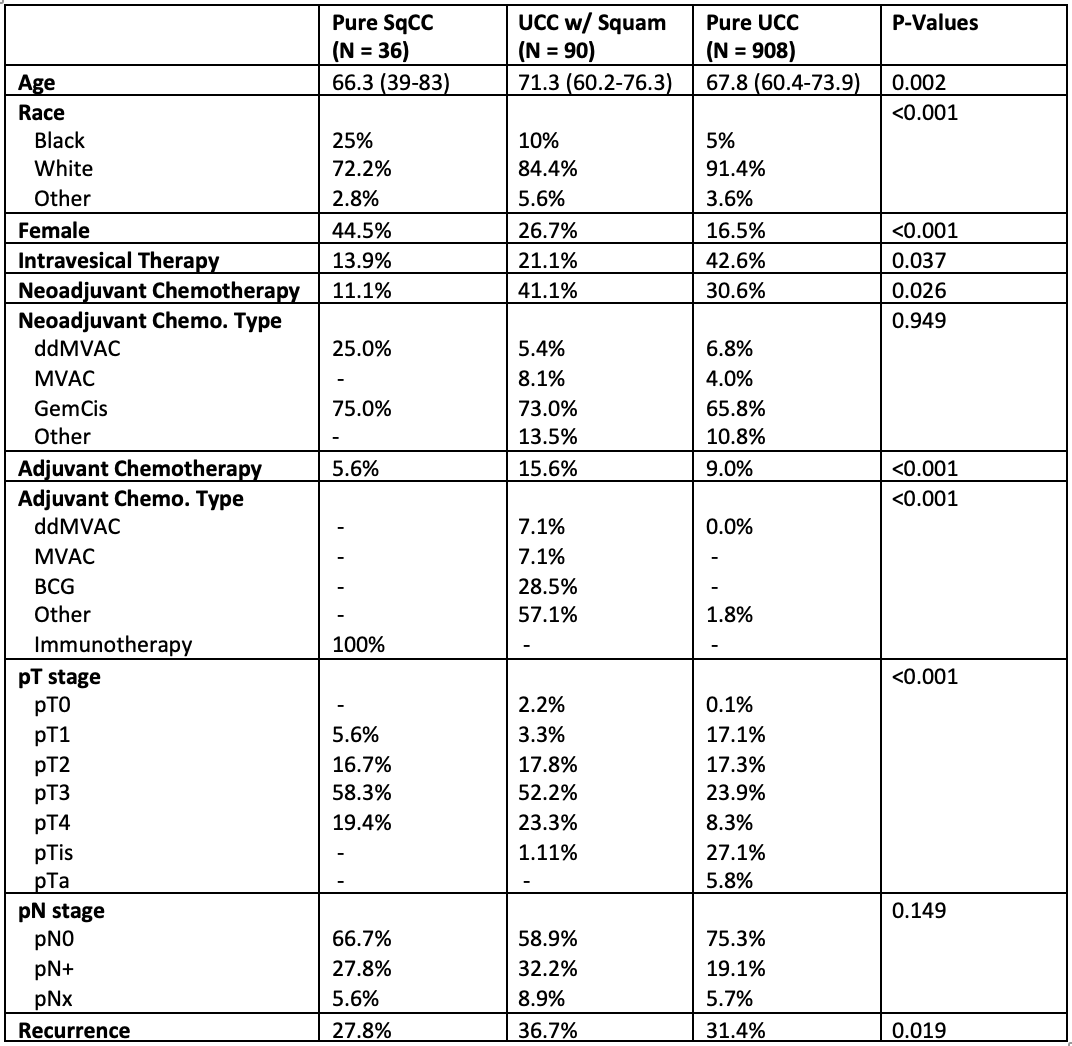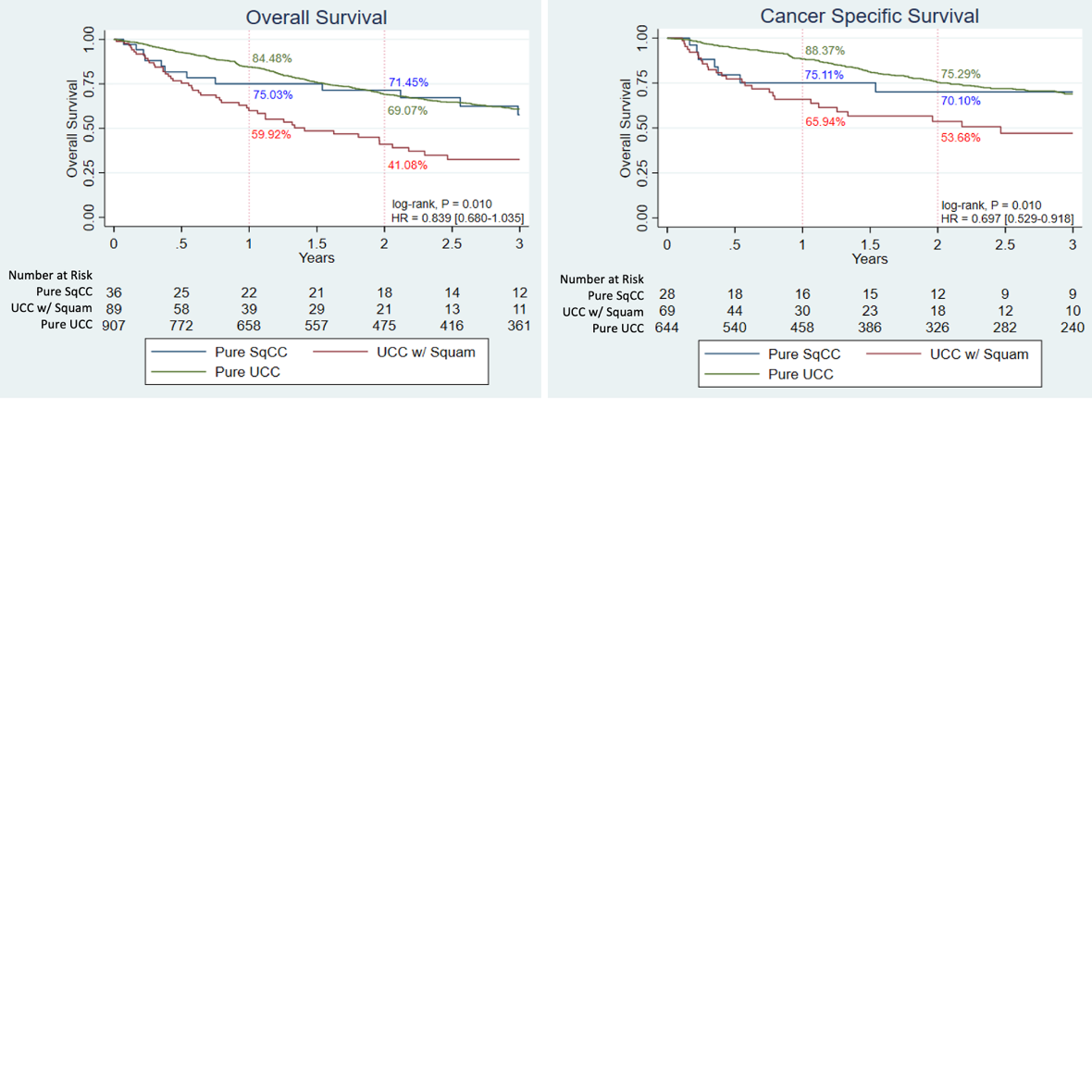Back
Poster, Podium & Video Sessions
Moderated Poster
MP56: Bladder Cancer: Invasive V
MP56-08: Clinicopathologic and Survival After Cystectomy Outcomes in Squamous Cell Carcinoma of the Bladder
Monday, May 16, 2022
10:30 AM – 11:45 AM
Location: Room 228
Pranjal Agrawal*, Mary Rostom, Ridwan Alam, Michael Biles, Noah M. Hahn, Andres Matoso, Armine Smith, Baltimore, MD, Trinity J. Bivalacqua, Philadelphia, PA, Max Kates, Jean Hoffman-Censits, Sunil H. Patel, Baltimore, MD
.jpg)
Pranjal Agrawal, BA
Johns Hopkins School of Medicine
Poster Presenter(s)
Introduction: Squamous cell carcinoma of the bladder (SqCC) is a rare disease with limited management data. We sought to characterize the clinicopathologic and survival outcomes amongst patients with SqCC, and the effect of squamous differentiation within urothelial carcinoma (UCC w/ Squam) in comparison to muscle invasive pure urothelial carcinoma (UCC).
Methods: A retrospective single institutional analysis identified patients who underwent a cystectomy and diagnosed with SqCC, pure UCC, or UCC w/Squam (any %Sq. differentiation) histology of the bladder from 2000 to 2020. Clinicopathology was compared by histology. Overall survival (OS), cancer-specific survival (CSS), and recurrence free survival (RFS) were assessed using Kaplan-Meier methods and Cox regression.
Results: 1,034 patients were included in this analysis; 36 (3.5%) had SqCC, 90 (8.7%) had UCC w/ Squam, & 908 (87.8%) had pure UCC. Patients with SqCC were more likely to be African American, female, & younger compared to pure UCC and UCC w/ Squam (Table 1). Patients with UCC w/ Squam had higher rates of neoadjuvant chemotherapy (NAC) prior to & higher pathologic stage at the time of cystectomy compared to pure UCC or SqCC (Table 1). NAC rates were similar amongst sex (p=0.5) and race (p=0.3). A significant difference was noted in OS (p=0.010) and CSS (p=0.010) between the three groups, with UCC w/ Squam having the worst survival in both curves (Figure). No significant difference was noted in RFS (p=0.085), upper tract or distant recurrence, between the groups.
Conclusions: Patients with SqCC present at a younger age and are more likely to be female and African American, highlighting a higher risk group. UCC w/ Squam had overall worse survival suggesting conventional NAC for pure UCC may be ineffective for this cohort, potentially resulting in delay of surgery, contrary to the S8710 data on MVAC indication. Additional translational studies in these cohorts are planned to examine biologic mechanisms contributing to inferior clinical outcomes in the high-risk cohort.
Source of Funding: None


Methods: A retrospective single institutional analysis identified patients who underwent a cystectomy and diagnosed with SqCC, pure UCC, or UCC w/Squam (any %Sq. differentiation) histology of the bladder from 2000 to 2020. Clinicopathology was compared by histology. Overall survival (OS), cancer-specific survival (CSS), and recurrence free survival (RFS) were assessed using Kaplan-Meier methods and Cox regression.
Results: 1,034 patients were included in this analysis; 36 (3.5%) had SqCC, 90 (8.7%) had UCC w/ Squam, & 908 (87.8%) had pure UCC. Patients with SqCC were more likely to be African American, female, & younger compared to pure UCC and UCC w/ Squam (Table 1). Patients with UCC w/ Squam had higher rates of neoadjuvant chemotherapy (NAC) prior to & higher pathologic stage at the time of cystectomy compared to pure UCC or SqCC (Table 1). NAC rates were similar amongst sex (p=0.5) and race (p=0.3). A significant difference was noted in OS (p=0.010) and CSS (p=0.010) between the three groups, with UCC w/ Squam having the worst survival in both curves (Figure). No significant difference was noted in RFS (p=0.085), upper tract or distant recurrence, between the groups.
Conclusions: Patients with SqCC present at a younger age and are more likely to be female and African American, highlighting a higher risk group. UCC w/ Squam had overall worse survival suggesting conventional NAC for pure UCC may be ineffective for this cohort, potentially resulting in delay of surgery, contrary to the S8710 data on MVAC indication. Additional translational studies in these cohorts are planned to examine biologic mechanisms contributing to inferior clinical outcomes in the high-risk cohort.
Source of Funding: None



.jpg)
.jpg)